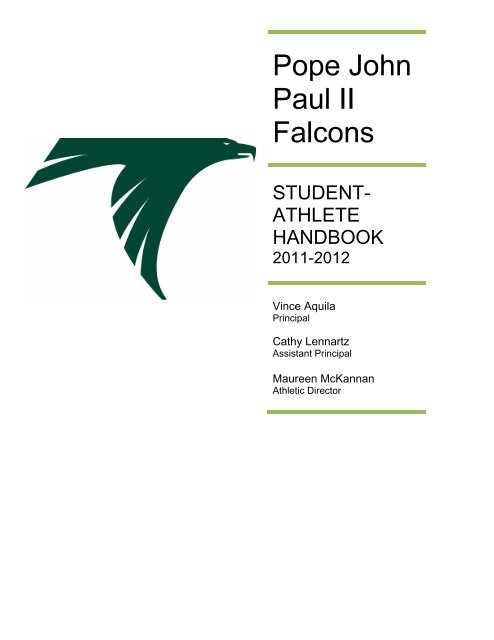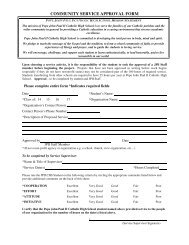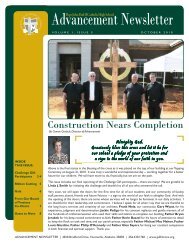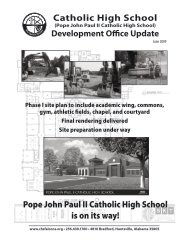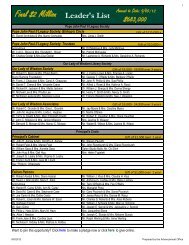student- athlete handbook - Pope John Paul II Catholic High School
student- athlete handbook - Pope John Paul II Catholic High School
student- athlete handbook - Pope John Paul II Catholic High School
You also want an ePaper? Increase the reach of your titles
YUMPU automatically turns print PDFs into web optimized ePapers that Google loves.
STUDENT-<br />
ATHLETE<br />
HANDBOOK<br />
2011-2012<br />
Vince Aquila<br />
Principal<br />
Cathy Lennartz<br />
Assistant Principal<br />
Maureen McKannan<br />
Athletic Director
JP<strong>II</strong> STUDENT-ATHLETE HANDBOOK<br />
Table of Contents<br />
Mission Statement ........................................................................................................................... 2<br />
Philosophy........................................................................................................................................ 2<br />
Athletic Goals and Objectives.......................................................................................................... 2<br />
To the Parent: .................................................................................................................................. 3<br />
To the Athlete:.................................................................................................................................. 3<br />
Governance...................................................................................................................................... 4<br />
The Alabama <strong>High</strong> <strong>School</strong> Athletic Association (AHSAA) ........................................................... 4<br />
The National Federal <strong>High</strong> <strong>School</strong> Associations (NFHS)............................................................. 4<br />
General Policies............................................................................................................................... 5<br />
Requirements for Participation......................................................................................................... 5<br />
JP<strong>II</strong> Academic Eligibility ................................................................................................................... 6<br />
Risk of Participation ......................................................................................................................... 6<br />
Attendance the Day Before and After a <strong>School</strong> Contest ................................................................. 6<br />
Attendance at Practices and Team Meetings.................................................................................. 7<br />
Financial Obligations and Equipment .............................................................................................. 7<br />
Parent/Staff Communication Policy ................................................................................................. 7<br />
Conduct of Athletes.......................................................................................................................... 8<br />
Good Sportsmanship for Students and Others ............................................................................ 8<br />
Letters, Awards, etc. ........................................................................................................................ 9<br />
Signature Page .............................................................................................................................. 10<br />
1
Mission Statement<br />
The mission of <strong>Pope</strong> <strong>John</strong> <strong>Paul</strong> <strong>II</strong> <strong>Catholic</strong> <strong>High</strong> <strong>School</strong> is to serve the families of our <strong>Catholic</strong><br />
parishes and the wider community by providing a <strong>Catholic</strong> education in a caring environment that<br />
stresses academic excellence. <strong>Pope</strong> <strong>John</strong> <strong>Paul</strong> <strong>II</strong> <strong>Catholic</strong> <strong>High</strong> <strong>School</strong> is committed to<br />
developing the total person in body, mind, and spirit. We pledge to teach the message of the<br />
Gospel and the Tradition, to form a school community of faith, to provide experiences of liturgy<br />
and prayer, and to guide <strong>student</strong>s to loving service. We will encourage, challenge, and support<br />
each <strong>student</strong> to learn enthusiastically, to lead honorably, and to live responsibly in our world.<br />
Philosophy<br />
One of the goals of our athletic program is to help our <strong>student</strong>-<strong>athlete</strong>s develop into productive<br />
citizens through learned acts of sportsmanship. The <strong>Pope</strong> <strong>John</strong> <strong>Paul</strong> <strong>II</strong> <strong>Catholic</strong> <strong>High</strong> <strong>School</strong><br />
Athletic programs successfully integrates the Gospel message that produce individuals who are<br />
faith-filled, have respect for others, value human life, and are willing to sacrifice for those in need.<br />
Our Athletic Department strives to offer our <strong>student</strong>s the opportunity to participate and succeed in<br />
a wide range of individual and team activities. Interscholastic sports should offer the skilled<br />
performer an opportunity to compete at the highest level, locally and state wide. JP<strong>II</strong> believes in a<br />
comprehensive physical activity and sports program, and strives to provide quality coaching and<br />
facilities. Budget and facilities will set practical limits on these but we strive to continually update<br />
our facilities and our coaches are constantly challenged to grow and improve.<br />
There should be no inherent conflict between athletics and academics. One of our fundamental<br />
responsibilities is to encourage each player to achieve academic success, not just to earn<br />
acceptable grades, but to secure a sound and solid education and to graduate with the best<br />
record possible. We encourage them to participate in other school activities, to be <strong>student</strong> leaders<br />
and instill an attitude to never accept and be satisfied with mediocrity.<br />
JP<strong>II</strong> <strong>student</strong>-<strong>athlete</strong>s are not expected to be like everybody else; they are expected to be like<br />
Christ. JP<strong>II</strong> <strong>student</strong>-<strong>athlete</strong>s realize that they are committed Christians who function everyday in<br />
the school community. They realize that religion needs to be alive in them inside and outside of<br />
athletic competition.<br />
Athletic Goals and Objectives<br />
Our Goal - The <strong>student</strong>-<strong>athlete</strong> shall become a more effective citizen in our society.<br />
Our Specific Objectives - The <strong>student</strong>-<strong>athlete</strong> shall learn:<br />
a) To promote religious education – Our society should begin and end in the person and<br />
teachings of Jesus Christ. His life, His work, and His teachings provide in-depth<br />
instruction on the relationship of human beings with the God who created them as well as<br />
the relationships with each other.<br />
b) To work with others - In our society a person must develop self discipline, respect for<br />
authority, and the spirit of hard work and sacrifice. The team and its objectives must be<br />
placed higher than personal desires.<br />
c) To be successful - Our society is very competitive. We do not always win, but we<br />
succeed when we continually strive to do so. You can learn to accept defeat only by<br />
striving to win with earnest dedication. Develop a desire to excel.<br />
d) To develop sportsmanship - To accept any defeat like a true sportsman, knowing we<br />
have done our best, we must learn to treat others as we would have others treat us. We<br />
need to develop desirable social traits, including emotional control, honesty, cooperation<br />
and dependability.<br />
e) To improve - Continual improvement is an essential component of good citizenship. As<br />
an <strong>athlete</strong>, you must establish a goal and you must constantly try to achieve that goal.
JP<strong>II</strong> STUDENT-ATHLETE HANDBOOK<br />
Try to improve in the skills and knowledge required and those personal traits that<br />
enhance the success of a team.<br />
f) To enjoy athletics - It is necessary for <strong>athlete</strong>s to enjoy participation, to acknowledge all<br />
of the personal rewards to be derived from athletics, and to give sufficiently of themselves<br />
in order to improve the program.<br />
g) To develop desirable personal health habits - To be an active, contributing citizen, it is<br />
important to obtain a high degree of physical fitness through exercise and good health<br />
habits, and to develop the desire to maintain this level of physical fitness after formal<br />
competition has been completed.<br />
To the Parent:<br />
This material is presented to you because your son or daughter has indicated a desire to<br />
participate in interscholastic athletics and you have expressed your willingness to permit him/her<br />
to compete. Your family interest in this important component of our school program is gratifying.<br />
We believe that participation in sports provides a wealth of opportunities and experiences which<br />
assist <strong>student</strong>s in personal adjustments.<br />
We are concerned with the educational development of boys and girls through athletics and feel<br />
that a properly controlled, well-organized sports program can meet <strong>student</strong> needs for selfexpression,<br />
social, mental and physical growth. It is our intent to conduct a program that is<br />
educationally sound in purpose and will enhance each <strong>student</strong>'s personal growth.<br />
A <strong>student</strong> who elects to participate in athletics is voluntarily making a choice of self-discipline and<br />
self-denial. These are the reasons we place such stress on good training habits. Failure to<br />
comply with the rules of training and conduct means exclusion from the squad. This concept of<br />
self-discipline and self-denial is tempered by our responsibility to recognize the rights of the<br />
individual within the objectives of the team. There is no place in high school athletics for <strong>student</strong>s<br />
who will not discipline their minds and bodies for rigorous competition. We are striving for<br />
excellence and do not want our <strong>athlete</strong>s to compromise with mediocrity.<br />
Likewise, we feel that you have committed yourselves to certain responsibilities and obligations.<br />
We would like to take this opportunity to acquaint you with specific policies that are necessary for<br />
a well-organized program of athletics.<br />
It is the role of the department of athletics to make rules that govern the spirit of competition for<br />
the school. These rules need a broad basis of community support, which is achieved only through<br />
communication to the parent. It is our hope to accomplish this objective through this athletic<br />
publication for <strong>student</strong>s and parents.<br />
To the Athlete:<br />
Being a member of a JP<strong>II</strong> Falcon athletic team is a fulfillment of an early ambition for many<br />
<strong>student</strong>s. The attainment of this goal carries with it certain traditions and responsibilities that must<br />
be maintained. A great athletic tradition is not built overnight; it takes the hard work of many<br />
people over many years. As a member of an interscholastic squad of <strong>Pope</strong> <strong>John</strong> <strong>Paul</strong> <strong>II</strong> <strong>Catholic</strong><br />
<strong>High</strong> <strong>School</strong>, you have inherited a wonderful tradition which you are challenged to uphold.<br />
Our tradition is to win with honor. We desire to win, but only with honor to our <strong>athlete</strong>s, our<br />
schools and our community. Such a tradition is worthy of the best efforts of all concerned. Over<br />
many years our squads have achieved league and tournament championships. Many individuals<br />
have set records and achieved A<strong>II</strong>-Area, All-State and All-Conference honors.<br />
3
JP<strong>II</strong> STUDENT-ATHLETE HANDBOOK<br />
It will not be easy to contribute to such a great athletic tradition. When you wear the colors of our<br />
school, we assume that you not only understand our traditions, but are willing to assume the<br />
responsibilities that go with them. However, the contributions you make should be a satisfying<br />
accomplishment to you and your family.<br />
h) Responsibility to Yourself: The most important of these responsibilities is to broaden and<br />
develop strength of character. You owe it to yourself to derive the greatest benefit from<br />
your high school experiences. Your academic studies, your participation in other<br />
extracurricular activities as well as in sports, prepare you for your life as an adult.<br />
i) Responsibility to your <strong>School</strong>: Another responsibility you assume as a squad member is<br />
to your school. <strong>Pope</strong> <strong>John</strong> <strong>Paul</strong> <strong>II</strong> <strong>Catholic</strong> <strong>High</strong> <strong>School</strong> cannot maintain its position as<br />
having an outstanding school unless you do your best in the activity in which you engage.<br />
By participating in athletics to the maximum of your ability, you are contributing to the<br />
reputation of your school. You assume a leadership role when you are on the athletic<br />
squad. The <strong>student</strong> body and citizens of the community know you. You are on stage with<br />
the spotlight on you. The <strong>student</strong> body, the community and other communities judge our<br />
school by your conduct and attitude, both on and off the field. Because of this leadership<br />
role, you can contribute significantly to school spirit and community pride. Make <strong>Pope</strong><br />
<strong>John</strong> <strong>Paul</strong> <strong>II</strong> <strong>Catholic</strong> <strong>High</strong> <strong>School</strong> proud of you, and your community proud of your<br />
school, by your consistent demonstration of these ideals.<br />
j) Responsibilities to Others: As a squad member you also bear a heavy responsibility to<br />
your home. If you never give your parents anything to be ashamed of, you will have<br />
measured up to the ideal. When you know in your heart that you have lived up to all of<br />
the training rules, that you have practiced to the best of your ability everyday and that you<br />
have played the game "all out," you can keep your self-respect and your family can be<br />
justly proud of you.<br />
The younger <strong>student</strong>s who may attend JP<strong>II</strong> <strong>Catholic</strong> <strong>High</strong> <strong>School</strong> are watching you. They will<br />
copy you in many ways. Do not do anything to let them down. Set good examples for them.<br />
Governance<br />
The Alabama <strong>High</strong> <strong>School</strong> Athletic Association (AHSAA)<br />
All schools are voluntary members of the Alabama <strong>High</strong> <strong>School</strong> Athletic Association and compete<br />
only with member schools. As a member school district, <strong>Pope</strong> <strong>John</strong> <strong>Paul</strong> <strong>II</strong> <strong>Catholic</strong> <strong>High</strong> <strong>School</strong><br />
agrees to abide by and enforce all rules and regulations promulgated by this association.<br />
The primary role of the state association is to maintain rules and regulations that ensure equity in<br />
competition for the <strong>student</strong>-<strong>athlete</strong>s and a balance with other educational programs. The<br />
association solicits input and is responsive to requests for rule modification from member schools,<br />
appointed committees, and coaches' associations. The state association attempts to enforce<br />
such rules that assure the greatest good for the greatest number and to ensure that competition<br />
is conducted in an appropriate manner.<br />
The National Federal <strong>High</strong> <strong>School</strong> Associations (NFHS)<br />
The NFHS consists of the fifty-one individual state high school athletic and/or activities<br />
associations. The purposes of the NFHS are to serve, protect and enhance the interstate activity<br />
interests of the high schools belonging to state associations; to assist in those activities of the<br />
state associations which can best be operated on a nationwide scale; to sponsor meetings,<br />
publications and activities which will permit each state association to profit by the experience of<br />
all other member associations; and to coordinate the work to minimize duplication.<br />
4
General Policies<br />
JP<strong>II</strong> STUDENT-ATHLETE HANDBOOK<br />
a) JP<strong>II</strong> coaches will follow and abide by all rules of the AHSAA and POPE JOHN PAUL <strong>II</strong><br />
<strong>Catholic</strong> <strong>High</strong> <strong>School</strong>.<br />
b) JP<strong>II</strong> coaches should encourage <strong>student</strong>s to participate in various sports in the JP<strong>II</strong><br />
program. A coach should never put <strong>student</strong>s in a position of having to choose one sport<br />
over another by any form of subtle pressure or influence with regard to an <strong>athlete</strong>’s future<br />
in a sport; any coach exercising such pressure is liable for removal of his coaching<br />
position.<br />
c) Athletic seasons are defined. Preseason, spring, and fall training shall only be with<br />
<strong>athlete</strong>s that not involved in other in during that season.<br />
d) Coaches are expected to hand out all available information on their teams to Athletic<br />
Director, parents and <strong>athlete</strong>s at the beginning of the season (i.e. coaching philosophy,<br />
scheduled practices and games, team rules, team policies, etc).<br />
e) All fund raising efforts must be approved by the Athletic Director and the Principal.<br />
f) All correspondence with the media must be approved by the Athletic Director, the<br />
Principal and the Marketing and the Communications Coordinator. Exception: Calling in<br />
Scores and Stats<br />
g) Coaches should monitor their <strong>athlete</strong>s at all times-before, during, and after practice,<br />
games, and/or team events.<br />
h) Use of profane or obscene language is not allowed at any time by coaches or <strong>athlete</strong>s.<br />
i) Athletes and coaches must dress appropriately for athletics and school functions.<br />
j) Parents who have <strong>student</strong>s playing JP<strong>II</strong> Athletics may not be a part of the JP<strong>II</strong> coaching<br />
staff.<br />
k) DUAL SPORT PARTICIPATION: A <strong>student</strong> may not participate in two sports during the<br />
same season. (No exceptions)<br />
l) ATHLETIC COMMITMENT: Athletes unable to honor their commitments to their chosen<br />
sport (including dance and cheerleading) for any reason (grades, disenchantment, peer<br />
pressure, etc) will be ineligible to participate in any other sport during that season. For<br />
teams that have tryouts, commitment will be constituted after the last team cuts have<br />
been made and a final roster has been posted. For teams which have no tryouts,<br />
commitment will be constituted after six (6) practice days. Athletes who are uncertain<br />
about making a commitment to a sports program are encouraged to discuss the program<br />
with the Athletic Director before they make a commitment.<br />
m) Athletes must comply with all items in the JP<strong>II</strong> <strong>School</strong> and athletic <strong>handbook</strong>.<br />
Requirements for Participation<br />
All forms are available on the JP<strong>II</strong> website. Go to the Athletic page under the “Links and Forms”<br />
tab.<br />
a) Physical Examination (use the AHSAA form)<br />
b) Star Certificate<br />
c) JP<strong>II</strong> Parent Liability Waiver form<br />
d) Concussion Parent/Student Liability Waiver Form (new for 2011 by AHSAA)<br />
e) Athletic Fee of $200 per sport must be paid before the 1 st competition.<br />
5
JP<strong>II</strong> STUDENT-ATHLETE HANDBOOK<br />
JP<strong>II</strong> Academic Eligibility<br />
At <strong>Pope</strong> <strong>John</strong> <strong>Paul</strong> <strong>II</strong> <strong>Catholic</strong> <strong>High</strong> <strong>School</strong>, the <strong>student</strong>-<strong>athlete</strong> must perform on and off the court.<br />
At JP<strong>II</strong>, academics are a key part to the success of our <strong>student</strong>-<strong>athlete</strong>s. The JP<strong>II</strong> Athletic<br />
Department has eligibility requirements are in accordance with the <strong>Pope</strong> <strong>John</strong> <strong>Paul</strong> <strong>II</strong> <strong>Catholic</strong><br />
<strong>High</strong> <strong>School</strong> as follows:<br />
1. The Athletic Director will begin checking grades at the 2 week period. Any <strong>student</strong> starting to<br />
struggle in a class will be strongly urged to begin tutoring in that class. Several of our<br />
teachers and <strong>student</strong>s are willing to help.<br />
2. August eligibility is based upon Alabama <strong>High</strong> <strong>School</strong> Athletic Association rules for eligibility<br />
which are based upon second semester grades, not fourth quarter grades. But a <strong>student</strong> who<br />
struggled at the end of the previous year will be closely watched for progress in the next year.<br />
3. ACADEMIC MONITORING—<br />
3.1. Any <strong>student</strong> who has two “D”s and/or one or more “F”s at the interim (4 ½ weeks into the<br />
quarter) will be required to attend academic tutoring in Meeting Room upstairs (Rm 308).<br />
During this time, the <strong>athlete</strong> may participate in all practices but cannot dress for<br />
competitions. If the academic class is Math or Chemistry, they must attend the tutoring<br />
sessions after school—this takes precedence over contests and practices.<br />
3.2. If the <strong>athlete</strong> has an “unexcused” absence (TBD by AD or coach) for morning tutoring<br />
session, their coach will be notified and the <strong>athlete</strong> will receive consequences at<br />
practice. Tutoring will continue for 4 ½ weeks until the quarter grades are posted.<br />
3.3. If an <strong>athlete</strong> has no more than (1) “D” on his/her report card, he/she will again be able to<br />
participate in the athletic contests and is no longer required to attend tutoring sessions.<br />
3.4. If the <strong>athlete</strong> grades has not improved (two D’s or one F), he/she will be ineligible to<br />
practice, dress for competitions, and is required to continue tutoring sessions until the<br />
next interim period (4 ½ weeks into the quarter).<br />
Note: Grades will be checked every two weeks.<br />
Risk of Participation<br />
All <strong>athlete</strong>s and parents must realize the risk of serious injury which may be a result of athletic<br />
participation. <strong>Pope</strong> <strong>John</strong> <strong>Paul</strong> <strong>II</strong> <strong>Catholic</strong> <strong>High</strong> <strong>School</strong> will use the following safeguards to make<br />
every effort to eliminate injury.<br />
a) Conduct a mandatory parent/<strong>athlete</strong> meeting prior to the start of the season to fully<br />
explain the athletic policies and to advise, caution and warn parents/<strong>athlete</strong>s of the<br />
potential for injury.<br />
b) Maintain a continuing education program for coaches to learn the most up-to-date<br />
techniques and skills to be taught in their sport.<br />
c) Instruct all <strong>athlete</strong>s about the dangers of participation in the particular sport.<br />
Attendance the Day Before and After a <strong>School</strong> Contest<br />
A <strong>student</strong> is expected to attend all classes on his schedule on the day of a contest and the next<br />
school day following the contest, habitual absences before and after a contest may result in<br />
suspension from the team. To be eligible to participate in the contest of the day, the <strong>athlete</strong> must<br />
be present at least 2 class on that day.<br />
6
JP<strong>II</strong> STUDENT-ATHLETE HANDBOOK<br />
Attendance at Practices and Team Meetings<br />
Team members are expected to be present at all practices, team meetings, contests, and special<br />
occasions unless excused by the head coach. If you are going to miss for any reason, it is the<br />
player’s responsibility to contact the coach (email, phone, etc.) 24 hours in advance.<br />
Financial Obligations and Equipment<br />
a) Each sport season, when squads are selected, <strong>athlete</strong>s may be assessed a athletic fee<br />
of $200 per sport to help maintain the high quality of the athletic program.<br />
b) Additional fundraising per team may be required to help purchase player warm-ups, team<br />
t-shirts, socks, or anything the player/coach is allowed to keep at the end of the season.<br />
c) Equipment/Uniform - All <strong>athlete</strong>s are responsible for the proper care and security of<br />
equipment/uniforms issued to them. <strong>School</strong> furnished equipment/uniform is to be worn<br />
only for contests and practice. All equipment not returned in good condition at the end of<br />
the season will be subject to a financial penalty.<br />
Parent/Staff Communication Policy<br />
Positive involvement in sports requires commitment from <strong>student</strong>s, parents, coaches, and<br />
advisors. To be successful, all involved must work to ensure effective communication. The<br />
following guidelines are intended to aid parents and staff in their interactions.<br />
Communication parents can expect from coaches:<br />
a) Location and time of practices and contests.<br />
b) Description of coach’s philosophy.<br />
c) Coach’s expectations for all the players on the squad as well as the individual role for<br />
each <strong>student</strong>-<strong>athlete</strong>.<br />
d) Team requirements, i.e. - fees, special equipment, off-season conditioning.<br />
e) Notification when a <strong>student</strong>-<strong>athlete</strong> is injured during participation.<br />
f) Notification of disciplinary action resulting in removal of <strong>student</strong>-<strong>athlete</strong> from participation.<br />
g) Request for support towards the commitment of the program. For example, coaches may<br />
ask a parent’s help in ensuring that a <strong>student</strong>-<strong>athlete</strong> is at practice on time or imposing a<br />
reasonable curfew.<br />
What are appropriate concerns for parents to discuss with coaches<br />
a) Skill improvement and development.<br />
b) Concerns about their child’s behavior, attitude and commitment.<br />
c) Guidance for an <strong>athlete</strong> interested in the next level of play after high school<br />
What things are not appropriate for parents to discuss with coaches<br />
a) Playing time<br />
b) Team strategy<br />
c) Play calling<br />
d) Other <strong>student</strong>-<strong>athlete</strong>s<br />
7
JP<strong>II</strong> STUDENT-ATHLETE HANDBOOK<br />
If a parent has a concern to discuss with a coach, what procedure should be followed<br />
a) The player will make the first initial contact; making an appointment with the coach to<br />
discuss his/her concerns.<br />
b) If the conflict is not resolved, the parent can call the coach to set up an appointment.<br />
c) If the coach cannot be reached, call the Athletic Director to set up a meeting with the<br />
coach, parent, and player.<br />
d) Please do not attempt to confront a coach before, during, or after a contest or practice.<br />
These are emotional times for both the parent and the coach. This time does not<br />
promote objective analysis of the situation.<br />
What can a parent do if the meeting with the coach did not provide a satisfactory resolution<br />
a) Call and set up an appointment with the Athletic Director to discuss the situation further.<br />
b) At this meeting, the coach, parents, and player will attend.<br />
We are continually attempting to improve communication with the <strong>student</strong>-<strong>athlete</strong>s and parents.<br />
For our program to be truly successful, it is necessary that everyone involved understand the<br />
direction the program is headed and to avoid unnecessary miscommunications. Positive and<br />
effective communication can only strengthen our program.<br />
Conduct of Athletes<br />
A firm and fair policy of enforcement is necessary to uphold the regulations and standards of the<br />
athletic department. The community, school administrators and the coaching staff feel strongly<br />
that high standards of conduct and citizenship are essential in maintaining a sound program of<br />
athletics. The welfare of the <strong>student</strong> is our major consideration and transcends any other<br />
consideration.<br />
All <strong>athlete</strong>s shall abide by a code of ethics (describe in JP<strong>II</strong> Student Handbook) which will earn<br />
them the honor and respect that participation and competition in the interscholastic program<br />
affords. Any conduct that results in dishonor to the <strong>athlete</strong>, the team or the school will not be<br />
tolerated. Acts of unacceptable conduct, such as, but not limited to theft, vandalism, disrespect,<br />
immorality or violations of law, tarnish the reputation of everyone associated with the athletic<br />
program and will not be tolerated.<br />
AHSAA CONDUCT RULE (EFFECTIVE 2010-2011)<br />
Coaches and players that are ejected from contests in all sports will receive the following<br />
penalties:<br />
a) First Ejection: Minimum $300 fine. (The fine can be reduced one time to $100 if the<br />
person fined completes the STAR Behavioral Mode within 10 days of the date of the<br />
ejection.)<br />
b) Second Ejection: Minimum one-game suspension and $500 fine<br />
c) Third Ejection: Minimum suspension for the remainder of the season and $750 fine<br />
NOTE: If an ejection occurs during the final contest of the season, a monetary fine will be placed on<br />
the school according to its severity and what number of ejection it is.<br />
Good Sportsmanship for Students and Others<br />
“Sportsmanship is that quality of honor that desires always to be courteous, fair and respectful<br />
and if is interpreted in the conduct of players, spectators, coaches, and school authorities,”<br />
Fielding H. Yost<br />
8
JP<strong>II</strong> STUDENT-ATHLETE HANDBOOK<br />
“<strong>Catholic</strong> school sportsmanship means positive, upbeat outlook toward the game, treating<br />
teammates and opponents with real respect, handling all facets of the contest as a game, and<br />
playing hard and intensely by fairly. <strong>Catholic</strong> school sportsmanship is characterized by honesty,<br />
integrity, good judgment, love of competition, cheerfulness, and self-control in defeat and<br />
unending graciousness in victory.” Rev. Richard McGrath<br />
To accomplish the above, <strong>student</strong>s must do the following:<br />
1) Keep in mind that a <strong>student</strong> spectator represents his school just as does the <strong>athlete</strong>.<br />
2) Realize that the good name of the school is more valuable than any game won by unfair<br />
play.<br />
3) Lead other spectators to respect officials by setting them a good example, by accepting<br />
decisions of officials without question.<br />
4) Respond to the calls of the cheer leaders especially when the team is losing.<br />
5) Be courteous to the visiting team both on and off the field of play.<br />
6) Impress upon the community its responsibility for sell control and fair play at all athletic<br />
contests.<br />
7) Suggest that any spectator who continually practices poor sportsmanship be requested<br />
not to attend future games.<br />
8) Give fair, courteous, and truthful accounts of athletic contests in local and school papers.<br />
9) Commend and applaud good sportsmanship by the visiting team.<br />
10) Express disapproval of abusive remarks from the sidelines.<br />
11) Be familiar with the state high school athletic rules. Support and enforce them.<br />
12) Encourage the discussion of fair play, sportsmanship, and school spirit through class<br />
work, auditorium programs, and club programs.<br />
Letters, Awards, etc.<br />
Letters and awards will be given as specified by the school award program and at the appropriate<br />
recognition activity as determined by the coaches and JP<strong>II</strong> administration. All participants are<br />
expected at these programs, just the same as they would be expected at a practice or team<br />
meeting.<br />
9
JP<strong>II</strong> STUDENT-ATHLETE HANDBOOK<br />
Signature Page<br />
I have read, understand and agree to comply with the provisions set forth in the pages of this<br />
athletic <strong>handbook</strong>.<br />
__________________________________________<br />
Date<br />
_______________________________________________<br />
Athlete’s Signature<br />
I agree to pay for any and all equipment, uniform, or school own property which I may lose,<br />
misplace or damage through carelessness or intent. I further agree to assume full responsibility<br />
for all equipment, uniform, or school owned property issued to me, and to confine the use of that<br />
equipment to practices, games, meets, etc.<br />
__________________________________________<br />
Date<br />
_______________________________________________<br />
Athlete’s Signature<br />
I, as parent of _____________________________________________, have read the rules and<br />
policies set forth for athletic participant at <strong>Pope</strong> <strong>John</strong> <strong>Paul</strong> <strong>II</strong> <strong>Catholic</strong> <strong>High</strong> <strong>School</strong>, and give my<br />
son or daughter permission to participate under these conditions. I will do my part in seeing that<br />
he/she follows these rules and regulations. I also give permission to the attending physician to<br />
give first aid and emergency treatment to my son or daughter should he or she require<br />
assistance.<br />
__________________________________________<br />
Date<br />
_______________________________________________<br />
Parent or Guardian’s Signature<br />
10


